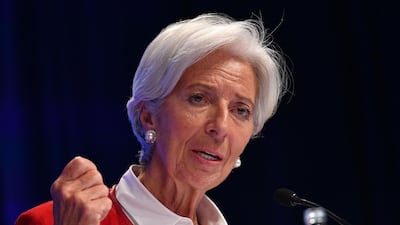Having reportedly agreed on a short list of candidates to replace Christine Lagarde as managing director of the International Monetary Fund, European governments are set to announce their nominee by the end of this week.
What they should be doing instead is support the merit-based nomination of candidates from both inside and outside Europe, as well as a better due diligence process. Otherwise, the IMF risks further damage to its credibility just when it could soon be called on to minimize damage from potential financial crises and currency wars.
First, some historical context. At the establishment of both the IMF and World Bank 75 years ago, members led by European countries and the US opted for a nationality-based approach. The resulting tradition, of an American heading the World Bank and a European the IMF, made operational sense in the immediate aftermath of the Second World War and, in fact, helped these institutions establish themselves.
But the system became increasingly outmoded and counter-productive as the world economy became more multipolar. The convention also lost more credibility every time European governments eschewed technical expertise and experience and instead nominated politicians, including some looking for a stepping stone to an even bigger position back home.
Under growing internal and external pressure, both institutions have made half-hearted attempts to reform. I remember being asked back in 2004, along with the highly respected economists and policy experts Andrew Crockett and Stanley Fischer, to allow our names to be put forward as candidates to lead the IMF. The aim was not to dislodge the European nominee at that time - which was impossible - but, instead, to encourage the IMF’s executive board to hold interviews for the post. It was hoped that this simple step could help move the two institutions toward a more merit-based, transparent and inclusive system.
The process did indeed evolve to include some basic ingredients that had been lacking before - not just a job interview but also a job description. Background checks were also said to have been conducted (though it later emerged that some of those selected had issues that would have fallen afoul of normal corporate due diligence processes, let alone the kind of high-level security screening that would be expected given the sensitive information that comes with this job). Yet, 15 years later, most people would readily agree that progress has been frustratingly slow.
Rather than speed up reforms, Europe and the US have adjusted their approach in a manner that retains their historic power. In the case of the IMF, this has involved ensuring that a European nominee is named at the start of the nomination period. The Europeans then immediately start lobbying other countries to secure their backing before a rival can be nominated by others.
Not surprisingly, attempts by third-country nationals to stand for election have failed. Having seen what has evolved in the last few leadership “contests,” few outside candidates now see any point in going through a process which gives them no realistic chance of winning, through no fault of their own.
This time around, it is taking Europe some time to unite on a candidate as, reportedly, the most qualified ones were either non-Europeans or “not European enough". Judging from what some officials have said about the short list, the process may have already bypassed some highly experienced professionals (such as Bank of England governor Mark Carney, former Indian central banker Raghuram Rajan, and Singapore Senior Minister Tharman Shanmugaratnam) that would have commanded immediate respect.
Like the World Bank election earlier this year in which the US candidate stood unopposed, the IMF leadership may well be handed uncontested to the European nominee. This will not help an institution that already faces a trust deficit among quite a few countries, and at an especially fragile time for the global economy. Multilateralism as a whole is subject to growing centripetal forces. Global policy coordination is unusually weak. The threat of currency wars is increasing, adding to trade tensions. Protracted reliance on unconventional monetary policy is increasing the probability of financial crises in individual countries, as well as possibility of a more systemic shock. As detailed in publications released on the 75th anniversary of the IMF’s establishment, several internal operational changes are becoming urgent, along with a strengthening of financial resources.
At this stage, it is highly unrealistic that Europe will pivot to a more credible approach, either by nominating someone truly based on merit or by withholding a nomination altogether and opening a genuine path for others. But, European governments could lead an effort to specify, as one of the objectives of the first 100 days of the new managing director’s tenure, the implementation of changes to the selection process that would reduce the chances of yet another one-sided, nationality-based pick in future. It should do so not only for its own sake, but to ensure a more credible and effective multilateral response if, as seems possible, unusually loose global financial conditions and weakening growth end up proving to be the calm before an economic and market storm.
Bloomberg

